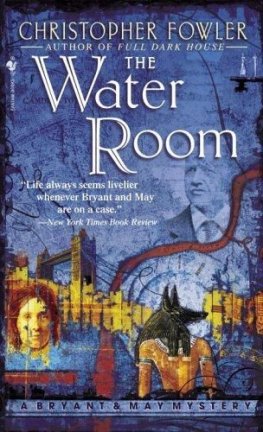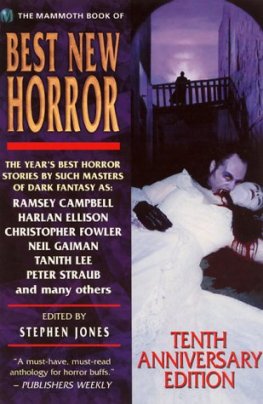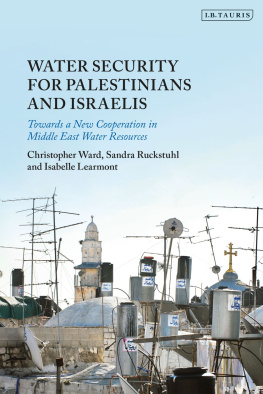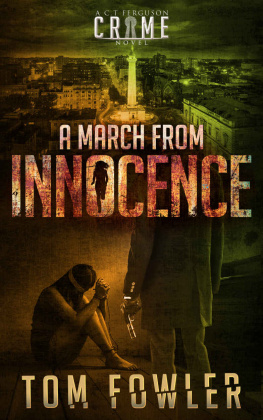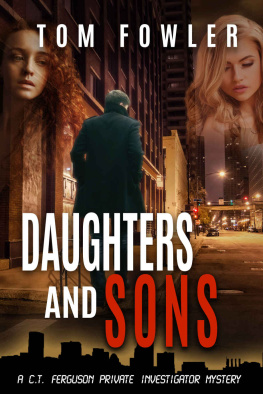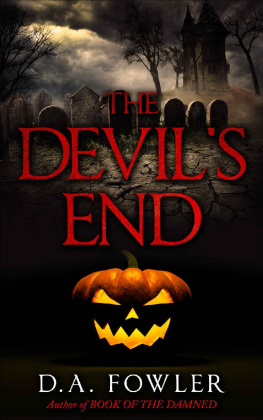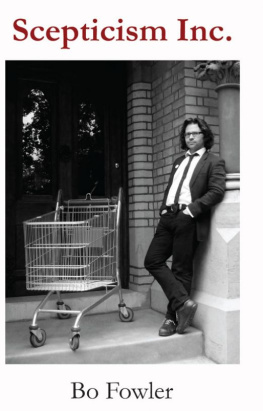Christopher Fowler - The Water Room
Here you can read online Christopher Fowler - The Water Room full text of the book (entire story) in english for free. Download pdf and epub, get meaning, cover and reviews about this ebook. year: 2006, genre: Detective and thriller. Description of the work, (preface) as well as reviews are available. Best literature library LitArk.com created for fans of good reading and offers a wide selection of genres:
Romance novel
Science fiction
Adventure
Detective
Science
History
Home and family
Prose
Art
Politics
Computer
Non-fiction
Religion
Business
Children
Humor
Choose a favorite category and find really read worthwhile books. Enjoy immersion in the world of imagination, feel the emotions of the characters or learn something new for yourself, make an fascinating discovery.
- Book:The Water Room
- Author:
- Genre:
- Year:2006
- Rating:4 / 5
- Favourites:Add to favourites
- Your mark:
- 80
- 1
- 2
- 3
- 4
- 5
The Water Room: summary, description and annotation
We offer to read an annotation, description, summary or preface (depends on what the author of the book "The Water Room" wrote himself). If you haven't found the necessary information about the book — write in the comments, we will try to find it.
The Water Room — read online for free the complete book (whole text) full work
Below is the text of the book, divided by pages. System saving the place of the last page read, allows you to conveniently read the book "The Water Room" online for free, without having to search again every time where you left off. Put a bookmark, and you can go to the page where you finished reading at any time.
Font size:
Interval:
Bookmark:
Christopher Fowler. The Water Room
(Bryant and May 2)
To Kath
WAAF conscript, greyhound-stadium cashier, legal secretary, debt collector, charity worker, critic, mother, friend-because everyone has a story
Home is a name, a word, it is a strong
one; stronger
than magician ever spoke, or spirit ever
answered to,
in the strongest conjuration
Charles Dickens
A little water clears us of this deed
Macbeth
ACKNOWLEDGEMENTS
The most bizarre facts in this book are the truest, but listing them all here would perhaps arm you with too much knowledge for the story ahead. They can, however, be readily found and substantiated by anyone interested in such arcane matters.
I would especially like to thank my fearless agent Mandy Little for providing so much support, encouragement and enthusiasm. Huge thanks also to my editor Simon Taylor, truly a gentleman and a man of his word, and to the whole Transworld team for ensuring the safe return of Bryant and May.
Thanks, Richard, for a million things, especially being funny and finding time, to Jim for always coming up with brilliant solutions, to Sally for organizing my life and to everyone brave enough to attend the atmospheric but occasionally insalubrious venues where I read, especially Maggie, Simon, Mike, Sarah, Andrew, Martin, Graham, Michelle, Poppy, Amber.

Mr Bryants highly unscientific map of the afflicted area.
1. A CHANGE IN THE WEATHER
Arthur Bryant looked out over London and remembered.
Fierce sunlight swathed Tower Bridge beyond the rockeries of smouldering bomb-sites. A Thames sailing barge was arriving in the Pool of London with a cargo of palm kernels. Its dusty red sails sagged in the afternoon heat as it drifted past Broadway Dock at Limehouse, like a felucca on the Nile. Dairy horses trotted along the deserted Embankment, empty milk cans chiming behind them. Children swam from the wharves below St Pauls, while carping mothers fanned away stale air from the river steps. He could smell horse dung and tobacco, meadow grass, the river. The world had once moved forward in single paces.
The vision wavered and vanished, displaced by sun-flares from the sealed glass corridors of the new city.
The old man in the unravelling sepia scarf waited for the rest of the party to gather around him. It was a Saturday afternoon at the start of October, and Londons thirteen-week heatwave was about to end with a vengeance. Already, the wind had changed direction, stippling the surface of the river with grey goose-pimples. Above the spire of St Pauls, patulous white clouds deepened to a shade reminiscent of overwashed socks. The enervating swelter was giving way to a cool breeze, sharp in the shadows. The change had undermined his groups stamina, reducing their numbers to a handful, although four polite but puzzled Japanese boys had joined thinking they were on the Jack the Ripper tour. Once everyone had settled, the elderly guide began the last section of his talk.
Ladies and gentlemen. . He gave them the benefit of the doubt. If you would care to gather a little closer. Arthur Bryant raised his voice as a red wall of buses rumbled past. We are now standing on Blackfriars-formerly Pitt-Bridge. Remember to use the hands, he told himself. Keep their interest. Bridges are causeways across great divides, in this case the rich city on the north side-hand usage to indicate north-and the more impoverished south side. Does anyone have a Euro note in their pocket? Take it out and youll find a bridge, the universal symbol for something that unites and strengthens. He paused, less for effect than to catch his breath. Bryant really had no need to freelance as a city tour guide. His detective duties at the London Peculiar Crimes Unit would have kept a man half his age working late. But he enjoyed contact with the innocent public; most of the civilians he met in his day job were under criminal suspicion. Explaining the city to strangers calmed him down, even helped him to understand himself.
He pulled his ancient scarf tighter and abandoned his set text. What the hell, they were the last group of the season, and had proven pretty unresponsive. According to Disraeli, he announced, London is a nation, not a city. That great cesspool into which all the loungers of the Empire are irresistibly drained, said Conan Doyle. No duller spectacle on earth than London on a rainy Sunday afternoon, according to De Quincey, so take your pick. One of the planets great crossing-points, it has more languages, religions and newspapers than any other place on earth. We divide into tribes according to age, wealth, class, race, religion, taste and personality, and this diversity breeds respect. Two members of the group nodded and repeated the word diversity, like an Oxford Street language class. God, this lots hard work, thought Bryant. Im gasping for a cup of tea.
Londons main characteristic is an absence of form. Its thirty-three boroughs have busy districts running through them like veins, with no visible hierarchy, and neighbourhood ties remain inexplicably close. Because Londoners have a strongly pronounced sense of home, where you live counts more than who you are. Bryant mostly lived inside his head. Remember the facts, he told himself, they like facts.
We have six royal parks, 160 theatres, 8,600 restaurants, 300 museums and around 30,000 shops. Over 3,500 criminal offences are reported every day. Poverty and wealth exist side by side, often in the same street. Bombings caused slum clearance and social housing, rupturing centuries-old barriers of class, turning the concept into something mysterious and ever-shifting. London is truly unknowable.
Bryant looked past his under-dressed audience to the swirling brown river. The Japanese boys were bored and cold, and had started taking pictures of litter bins. One of them was listening to music. A city of cruelty and kindness, stupidity and excess, extremes and paradoxes, he told them, raising his voice. Almost half of all journeys through the metropolis are made on foot. A city of glass, steel, water and flesh that no longer smells of beer and brick, but piss and engines.
He lifted his silver-capped walking stick to the sky. The arches of Londons Palladian architecture lift and curve in secular harmonies. Walls of glass reflect wet pavements in euphonious cascades of rain. He was no longer addressing the group, but voicing his thoughts. Were heading for winter, when a caul of sluggishness deepens into thanatomimesis, the state of being mistaken for death. But the city never dies; it just lies low. Its breath grows shallow in the cold river air while housebound tenants, flu-ridden and fractious with the perpetual motion of indoor activity, recover and grow strong once more. London and its people are parasites trapped in an ever-evolving symbiosis. At night the residents lose their carapace of gentility, bragging and brawling through the streets. The old London emerges, dancing drunk skeletons leaving graveyard suburbs to terrify the faint of heart.
Now even the hardiest listeners looked confused. They spoke to each other in whispers and shook their heads. Their guide seemed to be straying from his topic: A Historic Thameside Walk. The Japanese boys gave up and wandered off. Someone said, rather loudly, This tour was much better last time. There was a caf.
Bryant carried on, regardless.
London no longer suffers from the weight of its past. Now only the faintest resonance of legendary events remains. Oh, I can show you balustrades, pillars and scrollwork, point out sites of religious and political interest, streets that have witnessed great events, but to be honest theres bugger all to see. Its impossible to imagine the lives of those who came before us. Our visible history has been rubbed to a trace, like graffiti scrubbed from Portland stone. London has reinvented itself more completely than ever. And whoever grows up here becomes a part of its human history.
Font size:
Interval:
Bookmark:
Similar books «The Water Room»
Look at similar books to The Water Room. We have selected literature similar in name and meaning in the hope of providing readers with more options to find new, interesting, not yet read works.
Discussion, reviews of the book The Water Room and just readers' own opinions. Leave your comments, write what you think about the work, its meaning or the main characters. Specify what exactly you liked and what you didn't like, and why you think so.

